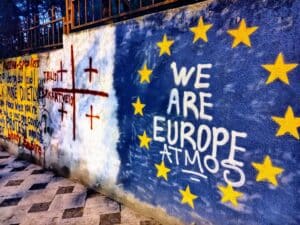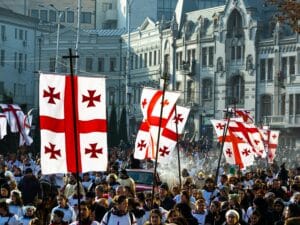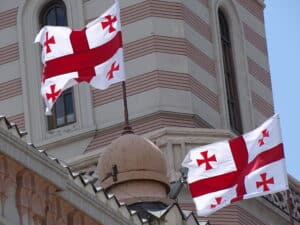Photo: Wikimedia Commons
On the 8th of July, a Gay Pride festival in Tbilisi, Georgia’s capital, was stormed by up to 5,000 members of violent far-right and pro-Russian groups, which led to its cancellation. The ‘protesters’ included Orthodox Christian clergy and waved Georgian flags while carrying religious icons. After marching toward the site of the event, they vandalised the stage, burned rainbow flags, set fires, looted the event’s bar, and played traditional Georgian folk music. Fortunately, the participants of the Pride event had already been evacuated before they approached. However, the executive director of LGBTQIA+ NGO ‘Forbidden Colours’ has expressed his wish for EU countries to give refuge to the organisers of the Georgian Pride event at their embassies, as “their lives are in danger” and “thousands of anti-LGBTIQA+ hooligans are hunting them down.”
Alarming signs ahead of the festival
In 2021, a similar Pride festival in Tbilisi was also aggressively disrupted by far-right groups, who attacked journalists and activists, which led to the death of a cameraman. The organiser of the Pride event, Mariam Kvaratskhelia, has stated that, in the days before this year’s Pride event, far-right groups were publicly inciting violence against activists. According to her, the police and the interior ministry declined to investigate these signs, despite requests. Both the organisers of the Pride event and Georgia’s president, Salome Zourabichvili, who is known to be critical of the government, argue that the police failed to protect the participants of the event and failed to ensure the participants’ right to safely assemble.
Which part did the authorities play?
Organisers of Tbilisi Pride believe that the disruption was preplanned and coordinated between the government and radical groups. They believe the Ministry of Internal Affairs to have collaborated with a violent, conservative group called ‘Alt-Info’, a group which has also organised a demonstration in 2022, protesting against both the gay parade and European integration. Georgia’s European integration and initiatives that rally for proper LGBTQIA+ rights seem closely connected in the minds of conservative, far-right groups. However, freedom of assembly and speech for all are key aspects of any democratic society, and this is not merely related to the European Union’s values.
Interior Minister Alexander Darakhvelidze and chairman of Georgia’s parliament Shalva Papuashvili, both members of the ruling Georgian Dream party, defended the conduct of the police. Papuashvili stated that “the police had an appropriate response” and “properly ensured the safety of both participants and journalists.”
Georgia’s anti-LGBTQIA+ politics
The fact that the government is not calling out the police forces for refusing to investigate the possibility of the disruption before, and the fact that it is being accused of cooperating with anti-EU and far-right groups should not come as a surprise, considering Georgia’s recent political trends: democratic backsliding, Russian influence, and political repression. Furthermore, the ruling Georgian Dream party has increasingly been embracing culturally conservative, orthodox Christian, and anti-LGBTQIA+ rhetoric.
What is highly concerning is not only the tragic violence at the Georgia Pride event, but also the way in which government authorities have fuelled this, both allegedly, by cooperating with far-right groups and indirectly, by spreading anti-LGBTQIA+ sentiments. For example, in a recent speech at the annual Conservative Political Action Conference (CPAC), Prime Minister Irakli Garibashvili spoke about forces who are “destructing the traditional family values and coercing false freedoms through LGBTQIA+ propaganda and attempts to legislate gender-affirming procedures for children”, stating that he wants to protect “the rights of the majority, for whom the family is a union between a man and a woman; where a woman is a mother, and a man is a father.” and proudly stating: “We protect the rights of the vast majority of the population, who supported my initiative in 2014, upon which our political party later included in the Constitution the definition of the marriage as the union between a man and a woman.” These statements are familiar with the wider trend of conservative, right wing, politicians worldwide, who frame ‘traditional’ values as being fundamental for democratic and resilient societies, through promoting the exclusion of certain groups of people.
In other words, the statements the Georgian government brings, together with the government’s refusal to support members of the LGBTQIA+ community is far beyond acceptable. These actions deny minorities fundamental rights and actively put them in a dangerous and highly vulnerable position. It is time for international actors, such as the EU, to hold the Georgian government accountable and to do everything they can to support the rights of those part of the LGBTQIA+ community in Georgia.
Written by Luna Sent


